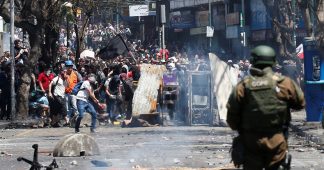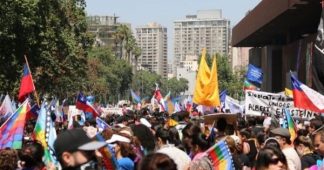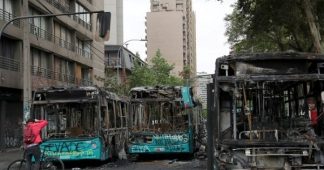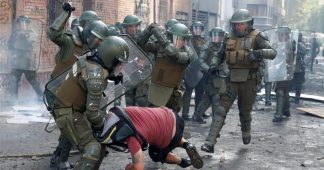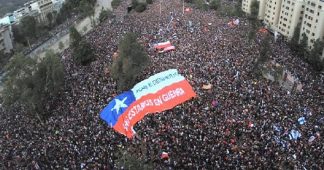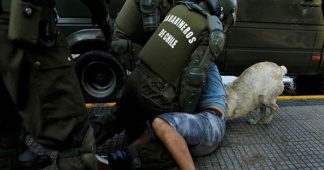Chile has been on fire for over a month. The protests began in opposition to subway fare hikes, but they soon became a nationwide call to oust the president and rewrite the constitution.
Nov.26, 2019
There are now mass mobilizations several days a week—two weeks ago, there was a massive general strike. Now, despite attempts to call off the protests, another general strike has been called. Over the last several weeks, President Sebastián Piñera has both provided many concessions and brutally repressed the protests. The latest concession was for a referendum in April to decide if and how Chile will rewrite its constitution, although it is clear that all the choices will provide undue power to the capitalists and their parties. This was signed by the establishment parties, as well as by the progressive party, the Frente Amplio.
The union section of the Social Unity Table—an organization of the leaderships of social movements and unions—has called for a mobilization and a strike on November 26 and 27 against the “Peace Agreement” and the constituent process proposed by the government. This includes the Port Union, construction unions, and health associations. The ports were paralyzed starting on Monday, November 25.
Read more at https://www.leftvoice.org/chilean-political-parties-sign-peace-agreement-workers-respond-with-a-general-strike
Revolutionary Rehearsals in Chile’s Uprising
By Nov.22, 2019
It’s been a month since the outbreak of protests in Chile, and people are still in the streets, protesting, blocking traffic and fighting the cops. In the first phase of the uprising, spontaneity prevailed. Masses of students and young protesters took to the streets, set subway stations on fire and defied the curfew and the police. Then, in October 25, came the “largest mobilization in Chile’s history,” when 2 million people demonstrated in Santiago. Bourgeois politicians, including even President Sebastián Piñera, rushed to congratulate the protesters in an attempt to ride the wave and tame the movement, which seemed to have peaked. The military was still on the streets, and the curfew was still in force in several cities. The government announced it was taking the army out of the streets and proposed a “social agenda” to appease the people in revolt. The subway fare hike was rolled back, and Piñera announced a set of bills that included an increase in the minimum wage and pension benefits, and the commitment to address other issues such as access to health and medications, a repeal of the last increase in the price of electricity, an increase in taxes on the rich and other measures. Importantly, most of these were merely bills to be presented in Congress and, therefore, far from being implemented.
But the next week a broad “vanguard” of more resolute protesters continued in the streets. Once mobilized, emboldened by the power they felt when taking over the streets, shutting down transportation and defying the police, they didn’t stop at a handful of “economic demands”—there was much more that needed an urgent solution. Popular outrage mounted in response to the brutal repression of the first weeks of protests, which included the deployment of the military, the murder of at least 23 protesters, and the more than 100 people who lost an eye as a result of being shot with rubber bullets. The hatred of the masses for the government and its association with the Pinochet regime became a strong driving force behind the continuing mobilizations. The political demands, then, took a more central place: Primarily, the calls for Piñera to resign and the pressure to radically transform the regime inherited from Pinochet’s dictatorship—which includes extraordinarily weak unions, an anti-democratic political system and the extreme commodification of health care, education, pensions, and more. “Fuera Piñera” became the rallying cry of millions.
Read more at https://www.leftvoice.org/revolutionary-rehearsals-in-chiles-uprising
